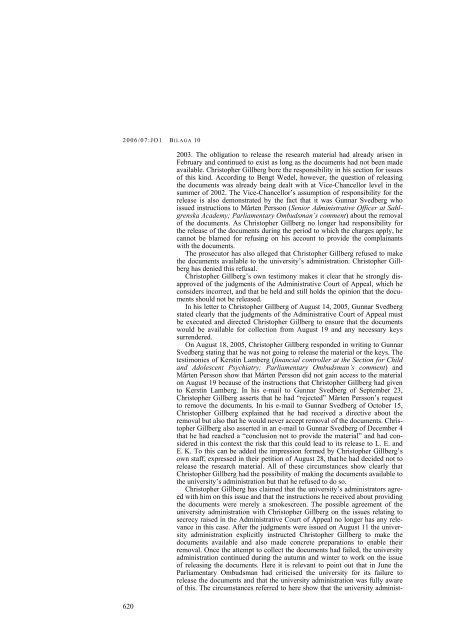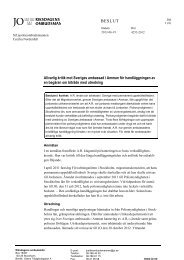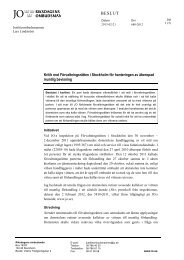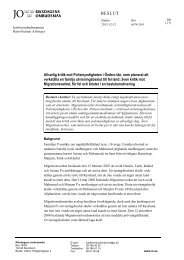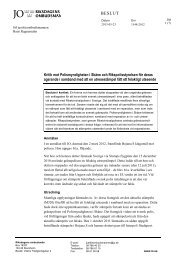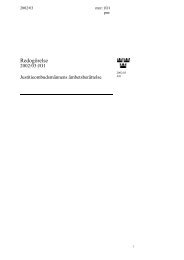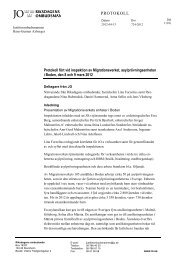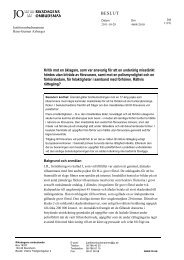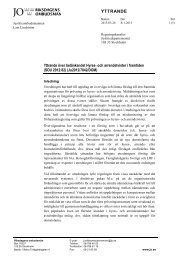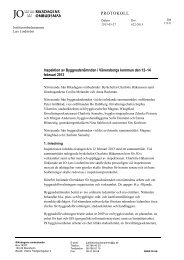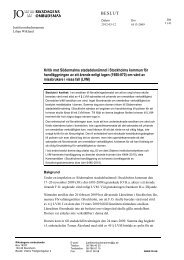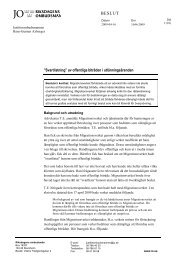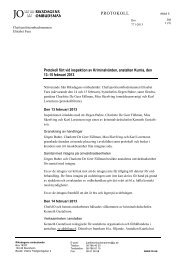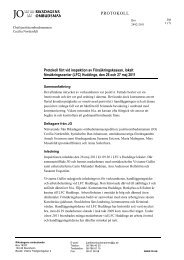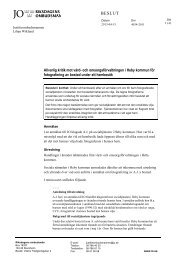- Page 1 and 2:
2006/07 mnr: JO1 pnr: Redogörelse
- Page 3 and 4:
Innehåll Skrivelse till riksdagen
- Page 5 and 6:
Central statsförvaltning, arbetsma
- Page 7 and 8:
Handläggning Fråga bl.a. om en so
- Page 9 and 10:
Fråga om avsaknad av fast besökst
- Page 11:
Kritik mot en rådman vid en länsr
- Page 14 and 15:
2006/07:JO1 14 2 Verksamheten 2.1
- Page 16 and 17:
2006/07:JO1 16 och åklagare - som
- Page 18 and 19:
2006/07:JO1 18 2.2.2 JO Kerstin And
- Page 20 and 21:
2006/07:JO1 20 vissa av de aktuella
- Page 22 and 23:
2006/07:JO1 22 2.2.3 JO Nils-Olof B
- Page 24 and 25:
2006/07:JO1 24 risken för strålni
- Page 26 and 27:
2006/07:JO1 26 2.2.4 JO Cecilia Nor
- Page 28 and 29:
2006/07:JO1 28 eftersom huvudmänne
- Page 30 and 31:
2006/07:JO1 30 Allmänna domstolar
- Page 32 and 33:
2006/07:JO1 32 rättighet annat än
- Page 34 and 35:
2006/07:JO1 34 följer att en opera
- Page 36 and 37:
2006/07:JO1 36 brottslighet (prop.
- Page 38 and 39:
2006/07:JO1 38 Disciplinansvar för
- Page 40 and 41:
2006/07:JO1 40 att inställa sig vi
- Page 42 and 43:
2006/07:JO1 42 Disciplinpåföljd k
- Page 44 and 45:
2006/07:JO1 44 Tingsrätts åtgärd
- Page 46 and 47:
2006/07:JO1 46 Av 14 § ärendelage
- Page 48 and 49:
2006/07:JO1 48 skulle kvarstå till
- Page 50 and 51:
2006/07:JO1 50 Ärendet remitterade
- Page 52 and 53:
2006/07:JO1 52 na godset enligt huv
- Page 54 and 55:
2006/07:JO1 54 Frågan är då slut
- Page 56 and 57:
2006/07:JO1 56 Agneta Blidberg anf
- Page 58 and 59:
2006/07:JO1 58 Principen om det ode
- Page 60 and 61:
2006/07:JO1 60 Bestämmelser om bes
- Page 62 and 63:
2006/07:JO1 62 Krister Petersson ha
- Page 64 and 65:
2006/07:JO1 64 För att kontrollera
- Page 66 and 67:
2006/07:JO1 66 samma för honom bea
- Page 68 and 69:
2006/07:JO1 68 stycket rättegångs
- Page 70 and 71:
2006/07:JO1 70 stationsbefälet nä
- Page 72 and 73:
2006/07:JO1 72 ten tolkat situation
- Page 74 and 75:
2006/07:JO1 74 fängelse kan följa
- Page 76 and 77:
2006/07:JO1 76 situation självfall
- Page 78 and 79:
2006/07:JO1 78 Enligt det upprätta
- Page 80 and 81:
2006/07:JO1 80 vudtaget inte tagit
- Page 82 and 83:
2006/07:JO1 82 bostad. När A.R. n
- Page 84 and 85:
2006/07:JO1 84 Kriminalvård Placer
- Page 86 and 87:
2006/07:JO1 86 ansökan om förflyt
- Page 88 and 89:
2006/07:JO1 88 tena till den bestä
- Page 90 and 91:
2006/07:JO1 90 rad anstaltsplacerin
- Page 92 and 93:
2006/07:JO1 92 Angående ordningsre
- Page 94 and 95:
2006/07:JO1 94 Kriminalvårdsinspek
- Page 96 and 97:
2006/07:JO1 96 18 § KvaL besöker
- Page 98 and 99:
2006/07:JO1 98 en vårdare, K.J. F
- Page 100 and 101:
2006/07:JO1 100 I Arbetsdomstolens
- Page 102 and 103:
2006/07:JO1 102 Beslutet om avskild
- Page 104 and 105:
2006/07:JO1 104 arbete även i olik
- Page 106 and 107:
2006/07:JO1 106 J.M. har även klag
- Page 108 and 109:
2006/07:JO1 108 Såvitt framgår av
- Page 110 and 111:
2006/07:JO1 110 J.L:s skrivelse rem
- Page 112 and 113:
2006/07:JO1 112 Sådan kontroll kan
- Page 114 and 115:
2006/07:JO1 114 Fråga om den rätt
- Page 116 and 117:
2006/07:JO1 116 intagna återgå i
- Page 118 and 119:
2006/07:JO1 118 den utbildning/komp
- Page 120 and 121:
2006/07:JO1 120 Av dåvarande 3 kap
- Page 122 and 123:
2006/07:JO1 122 byggdes under år 2
- Page 124 and 125:
2006/07:JO1 124 I en kommentar till
- Page 126 and 127:
2006/07:JO1 126 lagreglering. Det f
- Page 128 and 129:
2006/07:JO1 128 I Kriminalvårdssty
- Page 130 and 131:
2006/07:JO1 130 handled ovanför f
- Page 132 and 133:
2006/07:JO1 132 Av de uppgifter som
- Page 134 and 135:
2006/07:JO1 134 Typ av bevakningsup
- Page 136 and 137:
2006/07:JO1 136 Fråga om inflödet
- Page 138 and 139:
2006/07:JO1 138 Vid rundvandring i
- Page 140 and 141:
2006/07:JO1 140 vad arbetsmiljölag
- Page 142 and 143:
2006/07:JO1 142 han togs emot av pe
- Page 144 and 145:
2006/07:JO1 144 således den ansvar
- Page 146 and 147:
2006/07:JO1 146 Någon sådan motsv
- Page 148 and 149:
2006/07:JO1 148 I samband med visit
- Page 150 and 151:
2006/07:JO1 150 som granskats får
- Page 152 and 153:
2006/07:JO1 152 Innan registerkontr
- Page 154 and 155:
2006/07:JO1 154 I Kriminalvårdens
- Page 156 and 157:
2006/07:JO1 156 Enligt 5 § säkerh
- Page 158 and 159:
2006/07:JO1 158 Bedömning JO:s gra
- Page 160 and 161:
2006/07:JO1 160 Kronofogdemyndighet
- Page 162 and 163:
2006/07:JO1 162 s. 229). I de fall
- Page 164 and 165:
2006/07:JO1 164 mannen. Denne gör
- Page 166 and 167:
2006/07:JO1 166 Enligt 7 § förval
- Page 168 and 169:
2006/07:JO1 168 Central statsförva
- Page 170 and 171:
2006/07:JO1 170 Bolaget kommenterad
- Page 172 and 173:
2006/07:JO1 172 Utlänningsärenden
- Page 174 and 175:
2006/07:JO1 174 samband med utredni
- Page 176 and 177:
2006/07:JO1 176 Ett av flera skäl
- Page 178 and 179:
2006/07:JO1 178 den synskadade flic
- Page 180 and 181:
2006/07:JO1 180 firande av att en e
- Page 182 and 183:
2006/07:JO1 182 uttalandena befann
- Page 184 and 185:
2006/07:JO1 184 Under utredningen h
- Page 186 and 187:
2006/07:JO1 186 Taxering och uppbö
- Page 188 and 189:
2006/07:JO1 188 Den 12 mars 2003 f
- Page 190 and 191:
2006/07:JO1 190 nämnd den 12 mars
- Page 192 and 193:
2006/07:JO1 192 Under förundersök
- Page 194 and 195:
2006/07:JO1 194 vad gäller de vid
- Page 196 and 197:
2006/07:JO1 196 Taxeringsåtgärder
- Page 198 and 199:
2006/07:JO1 198 handläggning av s
- Page 200 and 201:
2006/07:JO1 200 JO:s beslut i ett a
- Page 202 and 203:
2006/07:JO1 202 ifrågasätter om d
- Page 204 and 205:
2006/07:JO1 204 annan än fordonsä
- Page 206 and 207:
2006/07:JO1 206 Bakgrund Bestämmel
- Page 208 and 209:
2006/07:JO1 208 Automatisering av f
- Page 210 and 211:
2006/07:JO1 210 mer kvalificerade h
- Page 212 and 213:
2006/07:JO1 212 Socialtjänst Socia
- Page 214 and 215:
2006/07:JO1 214 ett sätt som är f
- Page 216 and 217:
2006/07:JO1 216 framför allt i enk
- Page 218 and 219:
2006/07:JO1 218 Yttranden över LVU
- Page 220 and 221:
2006/07:JO1 220 detta samtal kan f
- Page 222 and 223:
2006/07:JO1 222 sina skyldigheter o
- Page 224 and 225:
2006/07:JO1 224 fall föras utan at
- Page 226 and 227:
2006/07:JO1 226 _______________ I d
- Page 228 and 229:
2006/07:JO1 228 grannlaga uppgift,
- Page 230 and 231:
2006/07:JO1 230 snabb, effektiv han
- Page 232 and 233:
2006/07:JO1 232 I ärenden som avsl
- Page 234 and 235:
2006/07:JO1 234 traditionell myndig
- Page 236 and 237:
2006/07:JO1 236 Länsstyrelsen i V
- Page 238 and 239:
2006/07:JO1 238 om de är adekvata
- Page 240 and 241:
2006/07:JO1 240 Länsstyrelsens bes
- Page 242 and 243:
2006/07:JO1 242 5 Klagomålshanteri
- Page 244 and 245:
2006/07:JO1 244 Under handläggning
- Page 246 and 247:
2006/07:JO1 246 När det gäller L
- Page 248 and 249:
2006/07:JO1 248 l samband med utskr
- Page 250 and 251:
2006/07:JO1 250 I samband med B:s s
- Page 252 and 253:
2006/07:JO1 252 Inom Individ- och f
- Page 254 and 255:
2006/07:JO1 254 enligt 11 kap. 1 §
- Page 256 and 257:
2006/07:JO1 256 vistats i en stödf
- Page 258 and 259:
2006/07:JO1 258 inställning. I de
- Page 260 and 261:
2006/07:JO1 260 att dess inställni
- Page 262 and 263:
2006/07:JO1 262 och agera i LSS-fr
- Page 264 and 265:
2006/07:JO1 264 Vissa övriga fråg
- Page 266 and 267:
2006/07:JO1 266 Socialnämnden läm
- Page 268 and 269:
2006/07:JO1 268 som kan behöva hj
- Page 270 and 271:
2006/07:JO1 270 Socialförvaltninge
- Page 272 and 273:
2006/07:JO1 272 JO hämtade in och
- Page 274 and 275:
2006/07:JO1 274 Fråga om en social
- Page 276 and 277:
2006/07:JO1 276 Enligt 8 kap. 1 §
- Page 278 and 279:
2006/07:JO1 278 modern. S.K. inkom
- Page 280 and 281:
2006/07:JO1 280 R.K. flyttade in p
- Page 282 and 283:
2006/07:JO1 282 Saken M.B. gör en
- Page 284 and 285:
2006/07:JO1 284 Med detta synes nä
- Page 286 and 287:
2006/07:JO1 286 tid. Huvudsaken var
- Page 288 and 289:
2006/07:JO1 288 skall tillvaratas p
- Page 290 and 291:
2006/07:JO1 290 konsulter som gör
- Page 292 and 293:
2006/07:JO1 292 framgår av förarb
- Page 294 and 295:
2006/07:JO1 294 Makarna fick under
- Page 296 and 297:
2006/07:JO1 296 Enligt socialnämnd
- Page 298 and 299:
2006/07:JO1 298 ningen har inneburi
- Page 300 and 301:
2006/07:JO1 300 Lagen med särskild
- Page 302 and 303:
2006/07:JO1 302 Vid ankomsten till
- Page 304 and 305:
2006/07:JO1 304 ministerkommitté d
- Page 306 and 307:
2006/07:JO1 306 kvar hos föräldra
- Page 308 and 309:
2006/07:JO1 308 flytt och denna kom
- Page 310 and 311:
2006/07:JO1 310 När det gäller de
- Page 312 and 313:
2006/07:JO1 312 Handläggning Fråg
- Page 314 and 315:
2006/07:JO1 314 boendeenhet enligt
- Page 316 and 317:
2006/07:JO1 316 Bedömning Av utred
- Page 318 and 319:
2006/07:JO1 318 Sociala enheten vid
- Page 320 and 321:
2006/07:JO1 320 samtalet med Tanja
- Page 322 and 323:
2006/07:JO1 322 såsom för sent in
- Page 324 and 325:
2006/07:JO1 324 Anne Saaristo anfö
- Page 326 and 327:
2006/07:JO1 326 och verksamhet, som
- Page 328 and 329:
2006/07:JO1 328 genom insats enligt
- Page 330 and 331:
2006/07:JO1 330 Bestämmelser om ko
- Page 332 and 333:
2006/07:JO1 332 utan sade ensidigt
- Page 334 and 335:
2006/07:JO1 334 Till anmälan fogad
- Page 336 and 337:
2006/07:JO1 336 att en enskild inte
- Page 338 and 339:
2006/07:JO1 338 kontaktades polismy
- Page 340 and 341:
2006/07:JO1 340 LRV. Remissvaret ge
- Page 342 and 343:
2006/07:JO1 342 inte heller samarbe
- Page 344 and 345:
2006/07:JO1 344 Utredning Socialsty
- Page 346 and 347:
2006/07:JO1 346 det aktuella ärend
- Page 348 and 349:
2006/07:JO1 348 Har den legitimerad
- Page 350 and 351:
2006/07:JO1 350 I förarbetena till
- Page 352 and 353:
2006/07:JO1 352 relsen har tidigare
- Page 354 and 355:
2006/07:JO1 354 I ett beslut den 18
- Page 356 and 357:
2006/07:JO1 356 En reell samverkan
- Page 358 and 359:
2006/07:JO1 358 Socialförsäkrings
- Page 360 and 361:
2006/07:JO1 360 - Den 29 april 2004
- Page 362 and 363:
2006/07:JO1 362 Miljö- och hälsos
- Page 364 and 365:
2006/07:JO1 364 ningssätt innebär
- Page 366 and 367:
2006/07:JO1 366 Kritik mot en kommu
- Page 368 and 369:
2006/07:JO1 368 Mycket som framför
- Page 370 and 371:
2006/07:JO1 370 Om namnet finns int
- Page 372 and 373:
2006/07:JO1 372 Undantag från renh
- Page 374 and 375:
2006/07:JO1 374 Utifrån ovanståen
- Page 376 and 377:
2006/07:JO1 376 fråga om partiskhe
- Page 378 and 379:
2006/07:JO1 378 Holmlund angav län
- Page 380 and 381:
2006/07:JO1 380 band med kommunens
- Page 382 and 383:
2006/07:JO1 382 Ljusdals kommun, mi
- Page 384 and 385:
2006/07:JO1 384 Utbildnings- och ku
- Page 386 and 387:
2006/07:JO1 386 JO har i tidigare b
- Page 388 and 389:
2006/07:JO1 388 De omständigheter
- Page 390 and 391:
2006/07:JO1 390 2. Bollebygds kommu
- Page 392 and 393:
2006/07:JO1 392 digheten och vägh
- Page 394 and 395:
2006/07:JO1 394 nämnden beslutade
- Page 396 and 397:
2006/07:JO1 396 ärende som hon int
- Page 398 and 399:
2006/07:JO1 398 har ändrats medfö
- Page 400 and 401:
2006/07:JO1 400 För- och grundskol
- Page 402 and 403:
2006/07:JO1 402 personnummer för d
- Page 404 and 405:
2006/07:JO1 404 tera att antalet be
- Page 406 and 407:
2006/07:JO1 406 I 4 och 5 §§ för
- Page 408 and 409:
2006/07:JO1 408 Fråga om utformnin
- Page 410 and 411:
2006/07:JO1 410 Utredning Högskole
- Page 412 and 413:
2006/07:JO1 412 anhängighetsverkan
- Page 414 and 415:
2006/07:JO1 414 Kommunikationsväse
- Page 416 and 417:
2006/07:JO1 416 het upphör att gä
- Page 418 and 419:
2006/07:JO1 418 vid samma tidpunkt.
- Page 420 and 421:
2006/07:JO1 420 Vad gäller förval
- Page 422 and 423:
2006/07:JO1 422 att det blir till m
- Page 424 and 425:
2006/07:JO1 424 nämnden på grund
- Page 426 and 427:
2006/07:JO1 426 (domskälen), skall
- Page 428 and 429:
2006/07:JO1 428 och fått uppgift o
- Page 430 and 431:
2006/07:JO1 430 läggning. Stadsbyg
- Page 432 and 433:
2006/07:JO1 432 företagna sakpröv
- Page 434 and 435:
2006/07:JO1 434 Överförmyndarnäm
- Page 436 and 437:
2006/07:JO1 436 Nämnden har begär
- Page 438 and 439:
2006/07:JO1 438 Ärendet anmäldes
- Page 440 and 441:
2006/07:JO1 440 Handlingar som hör
- Page 442 and 443:
2006/07:JO1 442 att urvalet är til
- Page 444 and 445:
2006/07:JO1 444 De få nya personer
- Page 446 and 447:
2006/07:JO1 446 V.E. Som assistent
- Page 448 and 449:
2006/07:JO1 448 - - - Jan Lundgren
- Page 450 and 451:
2006/07:JO1 450 Initiativärende om
- Page 452 and 453:
2006/07:JO1 452 5 mars 2002. Såvit
- Page 454 and 455:
2006/07:JO1 454 Efter granskningen
- Page 456 and 457:
2006/07:JO1 456 uppgifter om S.S. t
- Page 458 and 459:
2006/07:JO1 458 Övriga kommunalfö
- Page 460 and 461:
2006/07:JO1 460 Britt-Marie Calado
- Page 462 and 463:
2006/07:JO1 462 tive Hans Andersson
- Page 464 and 465:
2006/07:JO1 464 För att ytterligar
- Page 466 and 467:
2006/07:JO1 466 Jag noterar dock at
- Page 468 and 469:
2006/07:JO1 468 Utredning Anmälan
- Page 470 and 471:
2006/07:JO1 470 Barn- och utbildnin
- Page 472 and 473:
2006/07:JO1 472 Formuleringen uttry
- Page 474 and 475:
2006/07:JO1 474 Måndag den 1 novem
- Page 476 and 477:
2006/07:JO1 476 JO har ordföranden
- Page 478 and 479:
2006/07:JO1 478 Försäkringskassan
- Page 480 and 481:
2006/07:JO1 480 Punkten 2 J.E.A. ha
- Page 482 and 483:
2006/07:JO1 482 även om han indire
- Page 484 and 485:
2006/07:JO1 484 Den 14 augusti 2003
- Page 486 and 487:
2006/07:JO1 486 egen del vägrat at
- Page 488 and 489:
2006/07:JO1 488 Emellertid skickade
- Page 490 and 491:
2006/07:JO1 490 berg skulle dömas
- Page 492 and 493:
2006/07:JO1 492 18 augusti som kund
- Page 494 and 495:
2006/07:JO1 494 När det gäller ti
- Page 496 and 497:
2006/07:JO1 496 skapscentrum. I ins
- Page 498 and 499:
2006/07:JO1 498 Sammanfattning Näm
- Page 500 and 501:
2006/07:JO1 500 frihetsförordninge
- Page 502 and 503:
2006/07:JO1 502 I samtliga fall yrk
- Page 504 and 505:
2006/07:JO1 504 Nämnden har vidare
- Page 506 and 507:
2006/07:JO1 506 avstå från att up
- Page 508 and 509:
2006/07:JO1 508 E.F. kommenterade r
- Page 510 and 511:
2006/07:JO1 510 pågående debatten
- Page 512 and 513:
2006/07:JO1 512 M.S. gavs tillfäll
- Page 514 and 515:
2006/07:JO1 514 politiker justerar
- Page 516 and 517:
2006/07:JO1 516 och förvaltningsor
- Page 518 and 519:
2006/07:JO1 518 att VLT rapporterar
- Page 520 and 521:
2006/07:JO1 520 penbarligen inte. L
- Page 522 and 523:
2006/07:JO1 522 Mot bakgrund av de
- Page 524 and 525:
2006/07:JO1 524 nala självstyrelse
- Page 526 and 527:
2006/07:JO1 526 tionen alltid måst
- Page 528 and 529:
2006/07:JO1 528 BILAGA 1 Ärendesta
- Page 530 and 531:
2006/07:JO1 BILAGA 1 530 Tablå öv
- Page 532 and 533:
2006/07:JO1 BILAGA 1 532 Besluten i
- Page 534 and 535:
2006/07:JO1 BILAGA 1 534 Besluten i
- Page 536 and 537:
2006/07:JO1 BILAGA 2 536 20) Justit
- Page 538 and 539:
2006/07:JO1 BILAGA 2 538 JO Berggre
- Page 540 and 541:
2006/07:JO1 BILAGA 2 540 42) Närin
- Page 542 and 543:
2006/07:JO1 542 BILAGA 4 Inspektion
- Page 544 and 545:
2006/07:JO1 BILAGA 4 544 seminarium
- Page 546 and 547:
2006/07:JO1 BILAGA 5 546 Kanslichef
- Page 548 and 549:
2006/07:JO1 BILAGA 5 548 gation fr
- Page 550 and 551:
2006/07:JO1 BILAGA 6 550 Vid tillsy
- Page 552 and 553:
2006/07:JO1 BILAGA 6 552 styckena o
- Page 554 and 555:
2006/07:JO1 BILAGA 6 554 bestämmel
- Page 556 and 557:
2006/07:JO1 556 BILAGA 7 Arbetsordn
- Page 558 and 559:
2006/07:JO1 BILAGA 7 558 § 6 Byrå
- Page 560 and 561:
2006/07:JO1 BILAGA 7 560 tillämpni
- Page 562 and 563:
2006/07:JO1 562 BILAGA 8 Personalor
- Page 564 and 565:
2006/07:JO1 564 BILAGA 9 SAKREGISTE
- Page 566 and 567:
2006/07:JO1 BILAGA 9 566 myndighet
- Page 568 and 569:
2006/07:JO1 BILAGA 9 568 − uttala
- Page 570 and 571: 2006/07:JO1 BILAGA 9 570 − en han
- Page 572 and 573: 2006/07:JO1 BILAGA 9 572 Dödsfall
- Page 574 and 575: 2006/07:JO1 BILAGA 9 574 − att en
- Page 576 and 577: 2006/07:JO1 BILAGA 9 576 − ett ut
- Page 578 and 579: 2006/07:JO1 BILAGA 9 578 − handl
- Page 580 and 581: 2006/07:JO1 BILAGA 9 580 − kritik
- Page 582 and 583: 2006/07:JO1 BILAGA 9 582 − fråga
- Page 584 and 585: 2006/07:JO1 BILAGA 9 584 − en soc
- Page 586 and 587: 2006/07:JO1 BILAGA 9 586 − en pol
- Page 588 and 589: 2006/07:JO1 BILAGA 9 588 − uttala
- Page 590 and 591: 2006/07:JO1 BILAGA 9 590 Skattemynd
- Page 592 and 593: 2006/07:JO1 BILAGA 9 592 − förs
- Page 594 and 595: 2006/07:JO1 BILAGA 9 594 − efter
- Page 596 and 597: 2006/07:JO1 BILAGA 9 596 − initia
- Page 598 and 599: 2006/07:JO1 BILAGA 9 598 − fråga
- Page 600 and 601: 2006/07:JO1 BILAGA 9 600 − fråga
- Page 602 and 603: 2006/07:JO1 BILAGA 9 602 − initia
- Page 604 and 605: 2006/07:JO1 BILAGA 9 604 Återkalle
- Page 606 and 607: 2006/07:JO1 606 BILAGA 10 The Swedi
- Page 608 and 609: 2006/07:JO1 BILAGA 10 Schedule of c
- Page 610 and 611: 2006/07:JO1 BILAGA 10 610 As far as
- Page 612 and 613: 2006/07:JO1 BILAGA 10 612 the statu
- Page 614 and 615: 2006/07:JO1 BILAGA 10 614 Prosecuti
- Page 616 and 617: 2006/07:JO1 BILAGA 10 616 who took
- Page 618 and 619: 2006/07:JO1 BILAGA 10 618 On Januar
- Page 622 and 623: 2006/07:JO1 BILAGA 10 622 There is
- Page 624 and 625: 2006/07:JO1 BILAGA 10 624 In the Co
- Page 626 and 627: 2006/07:JO1 BILAGA 10 626 Gunnar Sv
- Page 628 and 629: 2006/07:JO1 BILAGA 10 628 5.3 Gunna
- Page 630 and 631: 2006/07:JO1 BILAGA 10 630 Appeal ag


